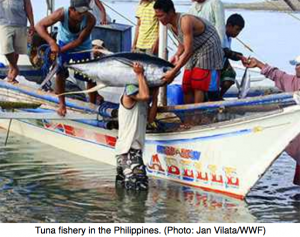Source & Author: FIS
A study on the socio-economic and environmental benefits of the Tuna Fisheries Improvement Project in the Philippines reveals that the changes driven by the European market towards sustainable development are having a large positive impact on developing countries.
The results of the new WWF research were released on Tuesday by the conservation organization during the celebration of World Tuna Day.
“The demand from European consumers, retailers and businesses, as well as the political pressure exerted by the EU, have generated significant changes in marine resources and the livelihood of those who depend on them,” said Raul Garcia, an expert in fishing of WWF.
Tuna is the main fishery product in the Philippines. WWF recalls that in 2013 it was number 1 fishery export, with a total value of EUR 509 million, and notes that almost 50 per cent of this value corresponds to exports to the EU.
According to the NGO, the analysis of a fisheries improvement project in two areas of the Philippines (Lagony Golf and Mindoro) – which supports 6,000 fishermen to shift their fisheries towards a sustainable and better quality market for the European market – manifested a variety of positive effects:
- EU laws and controls, red and yellow cards, imminent import bans for not taking action against illegal, unregulated and unreported (IUU) fishing.
- Demand for sustainable and better quality yellowfin tuna by European consumers, retailers and companies.
Likewise, the following improvements were observed:
- Positive ecological impacts: sustainable and legal fishing leads to sustainable fish stocks and fair competition.
- Positive social impacts: better income leads to better livelihoods.
- Positive impacts of governance and increased investment by national and local governments.
- Positive socio-economic impacts in fields such as gender equality and the empowerment of civil society.
WWF notes that the case study demonstrates that in order to continue progress and ensure that the European market promotes sustainable and responsible fisheries in developing countries, consumers must demand information, transparency and sustainable products.
“Distributors and processors must promote sustainability policies. And the authorities must ensure compliance with current legislation on illegal fishing, traceability and labelling,” says Garcia.

